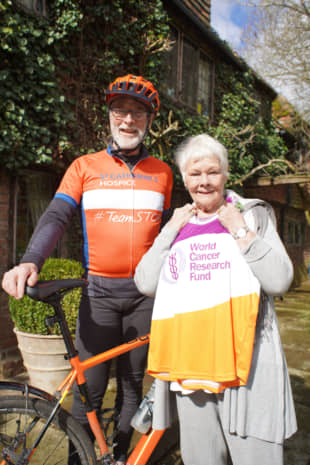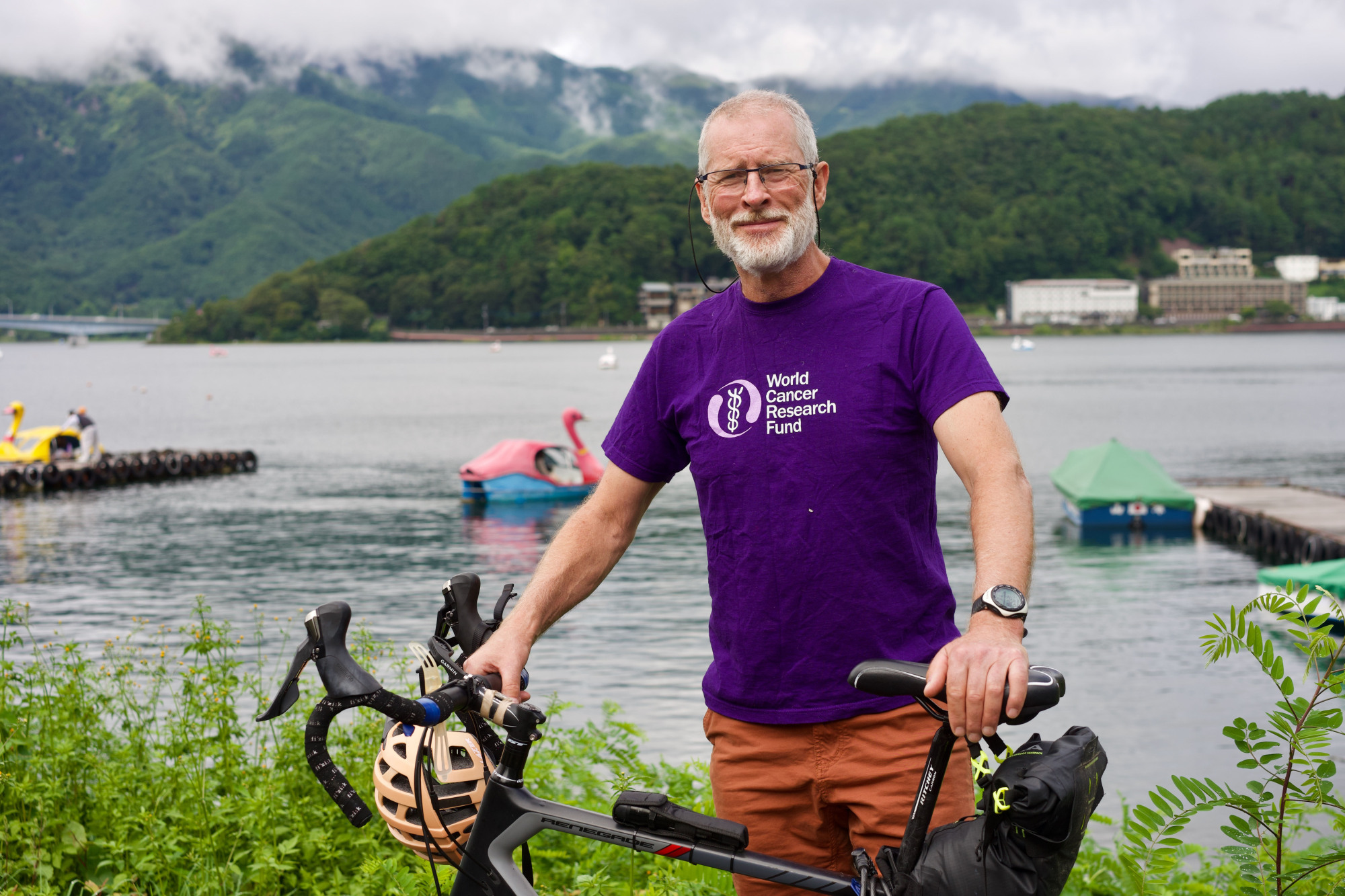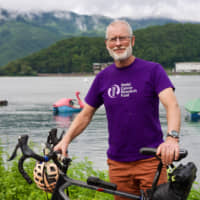On the rain-soaked shores of Lake Kawaguchi in Yamanashi Prefecture, Patrick McIntosh, 63, looks relaxed, unperturbed by the inclement weather. In the context of his recent accomplishment, it's a very minor inconvenience.
McIntosh is propped up on his bicycle, a carbon-fiber Jamis Renegade that he bought in Russia after his previous bike was stolen in the town of Tulun after almost two months cycling across the country as part of his 4½-month expedition to ride from London's Twickenham Stadium, the home of England Rugby, to Japan for the opening ceremony and first match of the Rugby World Cup on Friday.
The cyclist is no stranger to feats of extreme endurance, in 2015 he walked unaided to the South Pole, following a successful recovery from cancer.
"I'm a triple cancer survivor, so I've had my bowels removed, I've had a radical prostatectomy, and I've had skin cancer and I'm still alive," says McIntosh. "After I had first suffered those three cancers, I walked unaided to the South Pole, and raised a huge amount of awareness about early diagnosis, eating better food, taking a bit of exercise and remaining positive."
At the pole, McIntosh found a bicycle and, he jokes, became the "only bloke to have walked to the South Pole having suffered triple cancers and then cycled around the world in just 30 seconds."
Upon his return to the U.K., he decided he would attempt the challenge of cycling around the world "properly," using the Rugby World Cup 2019 as catalyst for the expedition. After he leaves Japan at the end of this month, he will attempt to complete his journey by crossing North America and Iceland next summer, before working his way through the rugby home nations — Ireland, Northern Ireland, Scotland and Wales — before finishing back at Twickenham.

McIntosh is using the journey to raise awareness and money for two cancer-related charities: World Cancer Research Fund and St. Catherine's Hospice, a hospice near his home in Crawley, England. He has been supported in doing so by veteran English actress Dame Judi Dench.
"(World Cancer Research Fund) very much speaks to my theory that huge amounts of cancer could be prevented if we ate better food and took a bit of exercise," he says. "Forty percent of cancers only occur because people don't look after themselves well enough and so their work is very much on how can we reduce the instance of cancer in the first place."
McIntosh left Twickenham on May 5 and followed the North Sea Route through Holland, Germany, Denmark and Sweden before arriving in St. Petersburg, Russia, later that month. There, he was granted a tourist visa that allowed him just 90-days to cross the country.
His route then followed that of the Trans-Siberian Railway through Vologda, Kirov and Perm, over the Ural Mountains to Yekaterinburg and Omsk before reaching Lake Baikal — the world's largest freshwater lake — in July.
Though McIntosh speaks with an emphatic fondness for Russia, cycling across the country he encountered numerous challenges — not least his bike being stolen. But one of the most difficult and persistent was the boredom he felt as he crossed the country's seemingly endless flatlands.
"I'm afraid you're either born with grim determination or not, and I'm afraid I seem to have been given huge amounts of grim determination," says McIntosh when asked how he overcame the ennui.
"I've been left on the planet for some weird reason to raise awareness about these things, and so therefore behind it all was the determination that I was jolly well going to get to Tokyo come hell or high water."
Earlier this month, McIntosh caught the ferry from Vladivostok to the city of Matsuyama on the island of Shikoku, before following Japan's Pacific coast toward Tokyo and resting briefly in Lake Kawaguchi before completing the final leg of his journey.
"Of course cycling in Japan is much easier than cycling across Russia," says Mcintosh. "The one thing about Japan is the hills and the variance. It was like I had died and gone to heaven once I got off the boat and cycled across the beach and through the rice fields and the southern part of Japan. Although it was boiling hot and 35 degrees, I just absolutely loved it. That combined with the food has (made Japan) a total joy."
Over the course of his expedition, McIntosh has eaten an entirely vegan diet — including in Japan, where vegan food can be notoriously hard to come by.
"Part of my project was to prove to everybody that you can take huge amounts of physical effort and you don't need to eat meat or dairy or fish or anything else, you can actually do it on vegetables and nuts," he says. "Indeed, I've been thinking for the last week or so, I wouldn't have been able to do it if I'd been eating meat or fish, partly because of my own biorhythm, but also because those sorts of foods are simply not very conducive to long-distance exercise."
Once he arrives in Tokyo, McIntosh will celebrate finishing this first phase of his circumnavigation at the opening game of the Rugby World Cup, which will be played between Japan and Russia.
"I was asked by the BBC who I'd be supporting, and I said to them I think I'd have to support Russia, given the fact that somehow I managed to get across Russia without being killed, mugged, lost or anything else," he says.
"And I have to say the stereotype view of Russia is completely wrong — as is most countries — and it was much more wonderful than I expected. So I'll be supporting Russia, even though I'm sure Japan will play well and probably beat them very easily."
To find out more about Patrick McIntosh's expedition and the charities he is supporting, visit kmgfoundation.co.uk/japan. The full interview with Patrick McIntosh can be heard on this week's episode of The Japan Times' "Deep Dive" podcast.





















With your current subscription plan you can comment on stories. However, before writing your first comment, please create a display name in the Profile section of your subscriber account page.